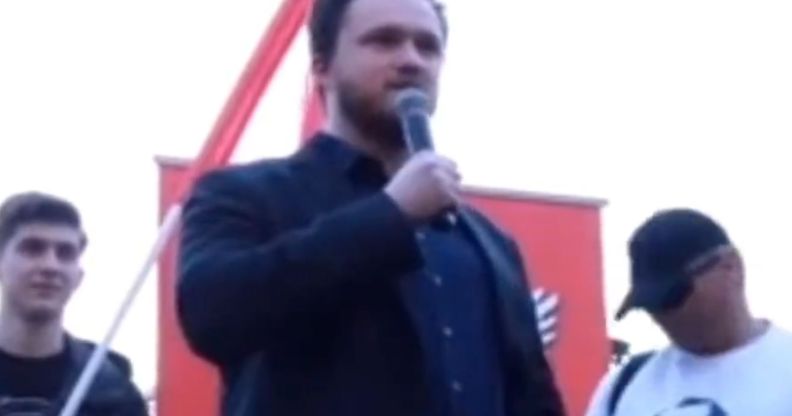Poland’s far-right party denies claims of ‘gay register’ as chilling clip resurfaces

Campaign manager Witold Tumanowicz making the remarks in 2014. (Twitter/X/krz_luksza)
A clip of a high-ranking, far-right party member in Poland pledging to register LGBTQ+ people in the country, has resurfaced amid the party sitting third in election polling.
A widely shared clip showing Witold Tumanowicz, from the Confederation Liberty and Independence alliance (Konfederacja party), making the claims, has caused distress among LGBTQ+ voters in Poland.
A spokesperson for the party denied this would happen if it came to power.
The Konfederacja’s campaign chief made the remarks during a rally, while representing the National Movement (Ruch Narodowy) ultra-nationalist political party during the elections in 2014.
It was broadcast on Poland’s state Polish Television (TVP) at the time, but has been shared again recently on social media.
In the clip, Tumanowicz can be heard remarking: “After the National Movement comes to power, we will register not only [homosexual] relationships but also individual f****ts so that none of them has the right to raise a child, be a school teacher or even come close to any child.
“People who have homosexual tendencies should not have contact with children, because it has a bad effect on their upbringing.”
He also shared his belief that same-sex couples should be put on a register if they want their right to a relationship to be recognised, which he said would “deprive them” of a right to adopt or have children.
After the clip resurfaced, several Polish rights activists condemned the rhetoric, claiming the speech was indicative of the far-right party’s views at large.
Poland human rights organisation, the Centre for Monitoring Racist and Xenophobic Behaviour, claimed the speech represented “Nazi views”.
Meanwhile, journalist and disinformation tracker, Krzysztof Łuksza, argued that, while the speech took place “some time ago”, Tumanowicz was unlikely to have changed his views.
A spokesperson for the Confederation Party, Anna Bryłka, told Polish news website Onet that the comments do not represent its views and that “nothing like that” would happen if came to power.
“As far as I know, his words were misunderstood and he didn’t have that in mind,” she said.
The rise of Poland’s Confederation Party
The Confederation Party was formed in 2018 out of both the dissolved National Movement Party and New Hope, a similarly right-wing party formed in 2015.
Several far-right groups joined the coalition in early 2019 as a so-called “pro-Polish coalition,” and the political alliance was recognised later that year.
While the political party has attempted to distance itself from anti-LGBTQ+ rhetoric, homophobic comments from party leaders have cemented their stance on the queer community.
In 2019, party co-leader, Grzegorz Braun, called for homosexuality to be criminalised, saying that “sodomites” should be sent to prison.
In the same interview, Braun shared a number of anti-semitic conspiracy theories, claiming “Jew-masons” were using “sodomites” as an attempt to bring about a “world revolution.”
Additionally, other party members, including candidate Ryszard Zajączkowski, pushed further conspiracy theories, claiming Poles were subjected to “genocide” at the hands of Jewish people working with communists.
Despite these and other comments, the confederation has risen sharply in the polls over the course of 2023.
Statistics from the poll aggregation site, ewybory.eu, show the party rose from 5.5 per cent approval to 10.2 per cent in just a year, putting them third in the polls.
Political experts have argued the shift in popularity has stemmed from the party distancing itself from its divisive views on social issues, including the LGBTQ+ community, to focus on economic issues facing the Polish population.
Despite this, the party has still made several right-wing promises in anticipation of the election next year, including liberalising access to firearms, banning abortion, including cases of rape and sexual assault, and further anti-immigration laws bolstered by its views on the Russian invasion of Ukraine.
“Confederation has long positioned itself as an anti-establishment force, promising to upend Polish politics and challenge the status quo,” Democracy Reporting International research co-ordinator, Jakub Jaraczewski, told Politico.
“As elections draw near, Confederation appears to be doing more and more of what its voters despise: traditional politics with backroom deals, coalition talks, transfers of deputies and ‘rotten’ arrangements made to hold and maintain power.”

